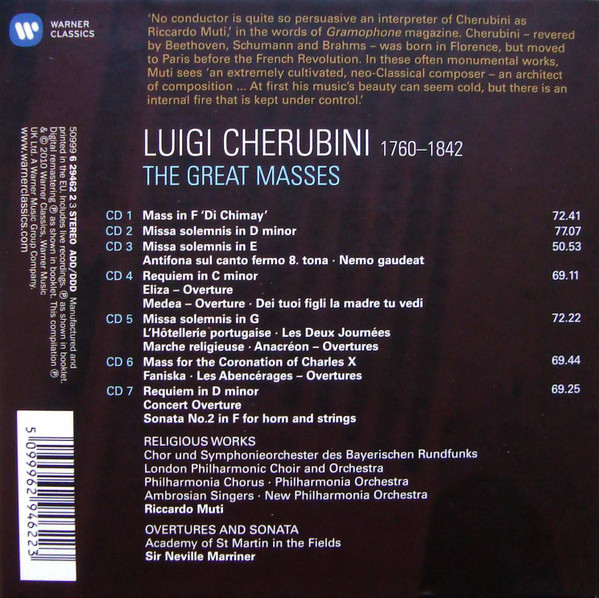Another quality composer
After covering the Masses of Haydn and Hummel, I wanted to move to another composer I was less familiar with.
That ended up being Luigi Cherubini. I can't say I am as taken with his sacred music as Hummel, nor am I as familiar with them as Haydn, but it was an enjoyable survey.
Muti didn't catch all of his major works, though. For example, there is the Mass in C Major with no less than eight soloists, and the Missa Brevis in B-flat Major, although that work may not actually be from the pen of Cherubini.
But we get the main works, plus some more. Why isn't anyone recording these? They are pleasurable to listen to, some portions sound rather difficult to put together, but in a world where there is no lack of Mahler and Bruckner, Mozart and Haydn, Bach and Handel, I think some more love could be spent on Cherubini.
Yet this set goes a long ways to introduce a composer caught between the French Monarchy and the French Revolution. If I had any quibbles with his Mass settings, they probably had to do more with what were probably concessions Cherubini had to pay to whomever was in charge in Paris at the time. Luckily he landed on a wonderful opus, his Requiem in D minor, written for his own funeral.
I am not so crazy about the extras, but at least EMI tried to fill up this set with more Cherubini from their archives. A real treat!
A review from 2024
The Masses of Luigi Cherubini cover his career in France from 1809-1835. Over that time, his large-scale choral/orchestral works show growth, both in economy of runtime and forces, but also in their quality.
The early Masses are of large proportions, with long runtimes and many soloists. The later Masses are shorn of soloists and bandy between pious devotion and full-throated, brass-laden coronation settings. By the time his last Requiem in D minor appears, Cherubini exhibits a very personal style.
Riccardo Muti recorded the later Masses from 1975-1988 with London-based performers, and the earlier Masses from 2001-2006 with Bavarian players and singers. Muti’s view of Cherubini’s sacred works are largely dramatic and powerful, and it works for me. I could see some wanting a more pious approach or a leaner band, but few have tried to record much of Cherubini’s music.
Of the 8 hours of music included in this 7CD set, only 10 minutes are dedicated to Cherubini’s motets, two in total, plus one aria from Medea featuring Maria Callas with Tullio Serafin. There is about 60-minutes worth of opera overtures, performed by the Academy of St. Martin in the Fields with Sir Neville Marriner, and while their playing is fine, Cherubini’s music is fairly tepid. Lest I forget, there is also a 7-minute Horn Sonata played by the great Barry Tuckwell, and it is wonderful.
But thankfully, this leaves a whole lot of orchestrated Masses and Requiems to savor, and it is high quality choral music to explore. The many choruses are uniformly excellent and the orchestras provide support, color, and impact at Muti’s bidding.
Listen on YouTube
A great set to explore, one which will gladly lead you into the depths of The Oozy Keep.
The balances are great, and Muti goes for power and drama. The performers are excellent, and hearing the progression of Cherubini in Sacred Music is interesting.
If the music isn't always convincing, as in the Overtures, EMI put together a quality package.
Find more Cherubini recordings HERE!



Comments
Post a Comment